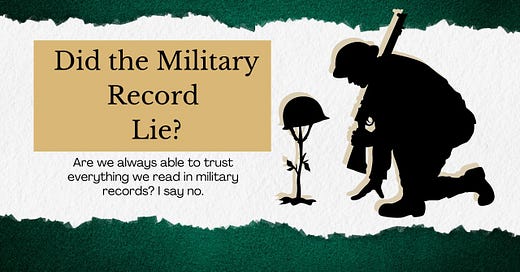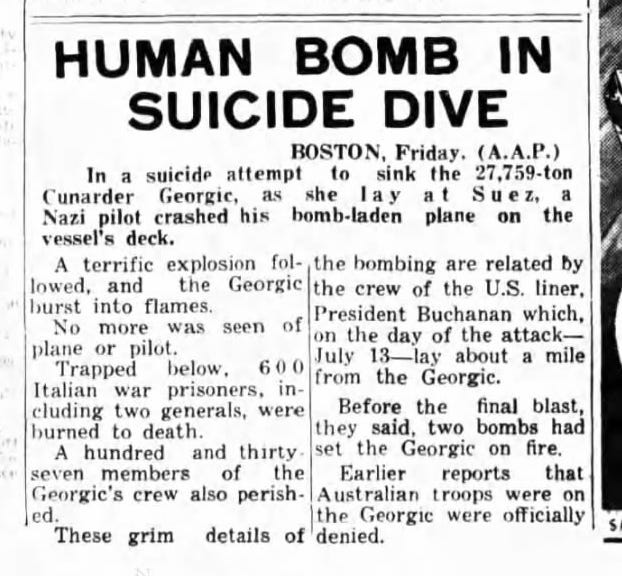Did the Military Record Lie?
Are we always able to trust everything we read in military records? I say no.
Do you trust every genealogy and military record your discover in your research? Do you question what you read? Do you take time to research events that are mentioned even though they don’t impact your family member or veteran? Do you just assume if it is within an official record it must be accurate?
I wouldn’t.
I encourage everyone, when I teach military research classes, to verify everything they find. The people that wrote military records were human and humans make mistakes. Also consider that some of the history reports were written long after the events took place. Memories fade or get jumbled due to enormous stress or seeing too many bombed out ships or tanks or too much death. Memories may jumble due to always being on alert for the next attack. How can one focus clearly when they are always looking for the next bad thing to happen?
Additionally, a military report may be dated for a short time period of a month, but a lot can happen in a month to create inconsistencies in the true events being recorded. Some histories are written after the fact, months or years, with the help of other documents, which may or may not be accurate. A little research can help you sort out what may be accurate and what may not be, if you take the time.
I’ll give you an example of what I mean.
Merchant Marine Ships SS John Lykes, 1942
I’m working on a client book project for a man whose father was in the Merchant Marines. In 1944 he was on the SS John Lykes. You may be wondering why I mention 1942 if the seaman wasn’t on board at that time.
I have a report from 1942 that is a very well written narrative, about life on board that ship in 1942. April - end of summer to be exact. It was written by Lt. (jg) John F. Dore. This report provides some in-depth context to life on a ship during World War II, that the 1944 reports do not offer.
How does this help me with the story? I can talk about the typical experiences of seamen and dangers they faced both at sea and in port. It also opens up new research questions and paths for the project and future book.
Interestingly, I found at least two personal connections to this particular report and it’s information. It provided me with general details about my grandpa’s experience and my AVG Flying Tiger’s experience, due to what is written in the report. Dore mentions a lot of other units, Allies, ports, ships, and more.
Now, is all the narrative true? Accurate? NO. At least I don’t believe so but I may never know the actual truth without a lot of extra digging on my own.
This is from the April 1942 of an Armed Guard report for the SS John Lykes. I’m specifically interested in the S.S. Georgic White Star Line ship. Did everyone on board burn alive? What exactly happened when this ship was hit? When did it happen? Where did it happen?
Evidence
I did some digging online for anything I could find on the S.S. Georgic. I discovered newspaper articles that mention the only person on board when the Germans hit the ship, was a barkeep. Also that this ship was attacked in Port Tewfiq at the Suez Canal, not at Karachi.
First of all, it makes zero sense that the barkeep was the only person aboard this troopship. Had everyone really gone ashore? Why would they have left a barkeep, who likely wasn’t an officer on board? Second, why does Dore say this ship at Karachi was the Georgic when all other reports state it was hit at Port Twefiq?
Second, through research I’ve done in the past, I know newspapers during the war didn’t always report the truth. It was changed or sanitized. Only by researching postwar, did I learn what really happened. This also sometimes applies to military records or studies done after the war.
However, searching the newspapers I did find an article dated October 4, 1941 from The Sun in Sydney, Australia, that stated a German pilot suicided himself with his bomb laden plane into the damaged vessel. Closer reading showed this event took place in mid-July 1941. Italian prisoners were on board and burned to death. This article also states there were more people on board than just the barkeep as had been reported by newspapers closer to the event.
Did Dore mix up his stories when he wrote the ship history? I need to re-read where this ship was prior to this date. However, the question remains, when did he actually write this report while he was on board this vessel? As things were happening or before he disembarked for his next assignment? Basically though, The ship was attacked in July 1941 but no one died. But in October it was reported it was hit by a suicide bomber and did kill prisoners. Later the ship was towed to Karachi. This is if we can believe the newspapers.
There are several websites that mention the ship and conveniently leave out whether anyone died as a result of the attack. In my limited search yesterday I could find no books that mentioned this ship.
So what really happened? I would have to dig into UK records to attempt to learn about this ship. I don’t have time for that and really no reason to explore further. Maybe the only reason this jumped out at me was so I could share the information with you dear reader. Help provide you another lens through which you can research your ancestors.
Remember, we have to pay attention to the detail that was written. The ship was hit a year before Lt. (jg) John F. Dore was in port to see the burned hull. Could Dore have mixed up the details about this ship losing everyone in the crew? Was he merging two stories, which were reported in the newspaper? Was he in the Suez and had seen it there but was writing about it while sitting in the port at Karachi, India? He’d been at sea in the USNR prior to being placed on this vessel for Armed Guard duty. Did he witness a burned ship elsewhere? Or were stories circulated in the port about what (didn’t) happen to make it more dramatic?
What is the truth?
One More Detail!
After I published this article this morning I had another question pop into my head. Was the SS Georgic towed to Karachi? A quick search online showed YES.
So Dore was describing what he saw in Karachi, but the exact details of the ship’s history were not laid out clearly.
Examine Your Own Research
As we consider the information, evidence, and questions presented above, I invite you to verify what you’ve discovered through your own research. Can you locate other sources to verify major events in which your veteran participated or witnessed?
Ask yourself if the information sparked your interest only because you needed a deeper understanding of, in this case, the brutality of war and what was hidden. Ask yourself if something feels “off” or “wrong” about what was presented in the report. This may make you question what is hidden in your own family history.
In the end, as we write stories of our ancestors or veterans, sometimes we will not find an answer. The best we can do is document everything and write it up as ‘It is possible…..I cannot verify this but that seems to be true……my grandpa told me this but the records showed that……’
What do you think? Have you stumbled upon inaccurate or difficult to verify information in your military or genealogy research? How did you handle it? Did it send you down a rabbit hole to explore something connected that made an impact on you? Did any of what you learned change your life? I’d love to know.
Would you like help researching your veteran’s service?
I am taking new clients right now for research and book projects. Email me at jennifer@ancestralsouls.com to discuss project possibilities.








Great work, Jennifer, and such a necessary reminder to never take anything in genealogy as absolute truth! My grandpa’s naval history is a fabulous example - I’m still untangling it, but the one thing I know to be true is that much of what he shared — and shared repeatedly throughout his life -/ was wildly inaccurate based on military records, published reports and private letters other crewmen sent home and which I’ve come across. I’ll never know why the basic facts of his tour were so different from what I now believe to be true, but I do feel bound to tell both versions. Thanks this piece.
I totally enjoyed the article. You did a great deal of research which proves that one should never take things at face value. Do your own research. Mistakes can be made and assumptions can be wrong. We are only human. Good job!